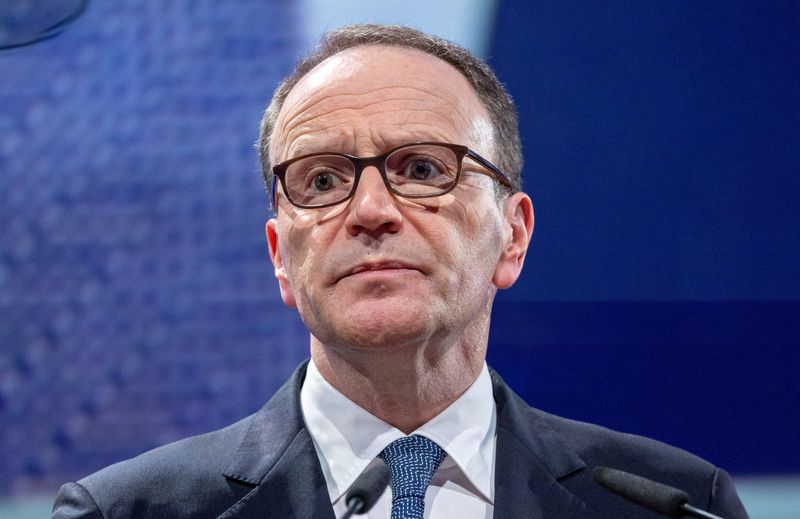By Richa Naidu
LONDON (Reuters) – Mark Schneider, Nestle’s not too long ago ousted CEO, steered the world’s largest meals maker by the COVID-19 pandemic, grew margins regardless of a subsequent provide chain crunch, and pulled off a historic reorganisation.
So when did he lose the board’s religion?
Whereas Nestle declined to touch upon the character of his departure when saying it on Thursday, and Schneider didn’t reply to a request to take action, three sources advised Reuters on Friday that the chief had been axed.
One supply mentioned the choice was reached after Nestle’s board grew to become more and more involved about weak gross sales progress. In addition they cited worries about slowing product growth, with new and revamped merchandise taking longer to be devised and rolled out.
“Two years ago, Mark Schneider could do nothing wrong; now he seems to get it all wrong,” Bernstein analyst Bruno Monteyne mentioned, flagging a drop in Nestle’s inventory, which has slid roughly 30% since its pandemic excessive in early 2022.
However, “is that a good reason to break up with a CEO that was only two years ago feted as the best CEO in the sector?” Monteyne requested.
Schneider, 58, in 2017 grew to become the primary firm outsider to guide the maker of KitKat bars and Nescafe espresso in almost a century. Its inventory peaked throughout his tenure, tapping a file of 129.5 Swiss francs ($152.73) initially of 2022.
That yr, he led an overhaul of the corporate, altering its government board to align with a brand new geographic construction.
The place rivals like PepsiCo (NASDAQ:) and Unilever (LON:) weren’t capable of maintain working margin progress within the seven years to 2023, Schneider grew Nestle’s to 17.3% from 16.5%.
This feat was significantly exceptional, given the hit trade margins took through the pandemic.
However the board’s considerations about sluggish gross sales volumes and underinvestment aren’t unfounded, and have been raised repeatedly in calls with analysts and buyers lately.
SLOW GROWTH, INNOVATION
Nestle has posted patchy gross sales progress by Schneider’s almost eight-year tenure compared to a few of its opponents, dropping the momentum it gained through the pandemic by alienating customers with too-high costs in 2023.
It and the remainder of the patron items trade hiked costs dramatically within the face of sky-rocketing provide chain and uncooked supplies prices, fuelling a world cost-of-living disaster.
In response to a query throughout his ultimate post-results name in July, Schneider acknowledged that offer chain constraints in 2022 had left “less energy” for innovation, which he mentioned might have inadvertently helped non-public label, or store-brand, items compete.
This was a brand new place – Schneider had beforehand dismissed the risk posed to Nestle by non-public label competitors, saying that whereas the corporate had seen “limited” indicators of that, it was prone to be non permanent. “I’m not concerned,” he mentioned on the time.
However within the yr to mid-June, in accordance with Nielsen knowledge analysed by Barclays, Nestle’s grocery retailer market share had fallen dramatically in Europe from the yr earlier than and been deeply damage within the U.S.
Different firms like PepsiCo and Unilever additionally misplaced market share and gross sales volumes because of greater costs. Nonetheless, these different main gamers have in latest quarters managed to spice up volumes once more, garnering reward from analysts for supporting their comebacks with innovation and robust promoting.
Nestle was initially much less capable of gradual its value hikes and even when it did final yr, volumes – or ‘actual inside progress’- stayed weak.
Schneider’s step again on advertising and marketing in 2022 has additionally been criticized repeatedly by buyers and analysts, regardless of his renewed push for promoting since.
He has mentioned himself that advertising and marketing was “quite muted” in 2022 because of provide chain and capability constraints.
His substitute, Laurent Freixe, a 62-year-old Frenchman, began working for Nestle 40 years in the past in advertising and marketing roles earlier than transferring up the ranks to government positions.

He’s seen as a meals trade insider, with a broad community of executives and specialists from inside and outdoors the Swiss group. He has instantly pledged to focus Nestle on natural progress fairly than acquisitions.
($1 = 0.8479 Swiss francs)




